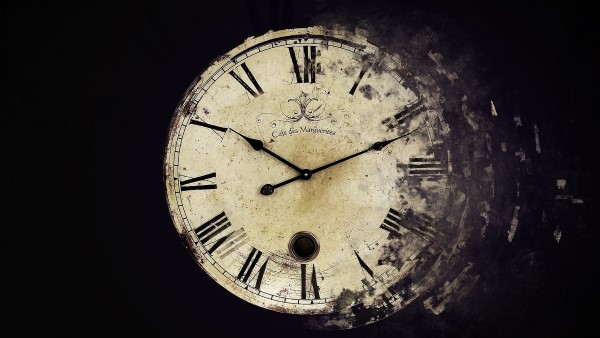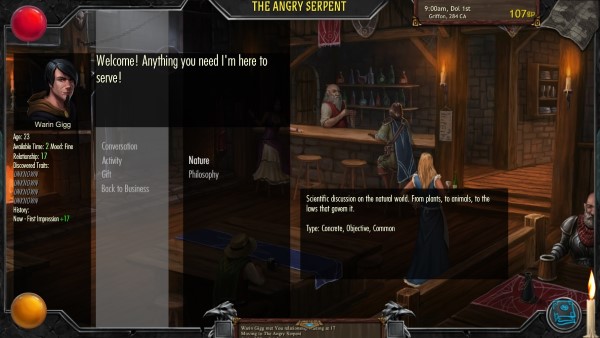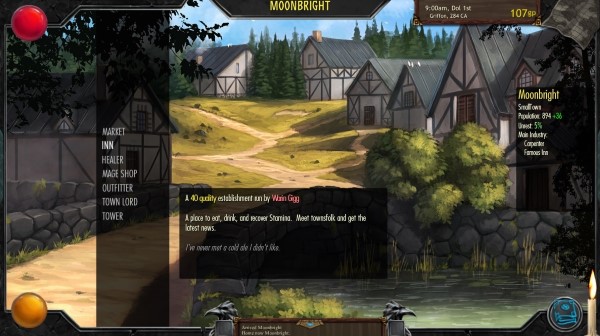
RPGs pride themselves on having deep immersive gameplay. Usually this is driven by epic narrative and story/character arcs. But have you noticed time doesn’t actually pass in Dragon Age, Skyrim, Final Fantasy, or Darkest Dungeon?
No one ages.
No townsfolk age and die of natural causes.
No NPC family grows by having a baby.
No NPC child ever grows up to adulthood.
No towns fade away due to declining population; Or villages grow into bustling cities.
The king/queen/council never lose power – unless directly due to player activity or scripted events.
Quest lines, usually involving some life & death problem, just sit in stasis until the player feels good and ready to solve it. Be it today, or a figurative 10 years from now!
If my three-year-old wants a cup of juice, she won’t wait the time it takes to write this sentence, yet the proverbial inn keeper with giant rats in the basement will happily wait an eternity for you to get around to his problem.
Can We Do Better Than This?
Archmage Rises is unusual in a number of ways, one particularly in that it explores the concept of Time as a Resource. We call it a “Mage Simulator” but since Steam doesn’t list this as a genre option, we’ll just keep calling it an RPG. An RPG where you play as a mage within a deep world simulation. Seasons pass. People age. We’re trying to stay true to pen and paper roleplaying like Pathfinder, Dungeons & Dragons, and a variety of excellent D20 supplements like The Magical Medieval Society. At the game store I own, role-players often share their campaign stories with me. The most beloved ones by players span decades, maybe even generations, of game world time.
The simple passage of time can bring both realism and epic-ness to a game. Here are 5 examples of how our team is doing Time as a Resource and some and some of the challenges we encountered in doing so.
1. Time Provides Natural Consequence to Player Choices
Archmage Rises takes place in a procedurally generated medieval fantasy world. The world, its history, treasures, and problems are created in one go at the start of a new game. The player is born at a randomly selected location, date, and year. Every following year on this day, the player ages one year.
Call it predestination or genetics, the game assigns a lifespan to the player character. They will live for around 50-80 years before dying of natural causes. (Losing a battle to a dragon is not natural causes!) The purpose of the game is to achieve as much as you can in the open world with the one life you are given.
With limited time, suddenly every choice has gravitas. Even seemingly small choices now matter. The question is no longer which order the player will do particular quests. It is which quests a player will choose to take on at all. The choice to spend 3 months travelling by foot to a far off city matters, there is an opportunity cost compared to what else the player could have done with that time. And they will never have more.
2. Townsfolk are Born, Age, and Die

In the typical RPG the Non-Player Characters (NPCs) who run the inn, clerk the weapon shop, or train your skills are always there.
Forever.
Narratively, they have no other life purpose than to be at your beck and call. Some games (Stardew Valley) have set time based routines of when and where the shop owner is. Some (Skyrim) allow the player to kill shop owners, causing the loss of their services. But they never age-out. Or get married. Or move away because they are sick of the orcs.
In Archmage Rises, every NPC has a birthdate and ages. Like the player, they have a set natural lifespan. Similar to Crusader Kings II, there are rules of succession. Man who runs the inn dies of a heart attack? Wife takes over. Wife dies of old age? One of the children take over - if they are of age.
Every NPC also gets “a turn” at a regular periodic rate. On their turn they can choose life events: meet someone, start a fight with someone they know, fall in love, get married, have a child, move, have a business set back, or suffer from a plague.
Relationships between player and NPC matter in Archmage Rises. So if an NPC had a baby since the last time you met/spoke with them, it gives a new conversation option. An opportunity to congratulate them and/or give them a gift.
The passage of time creates new ways for players to interact, and therefore role-play, within the world.
But how is this even possible? Doesn’t the game break if someone important dies of a heart attack?
I can answer that in two parts.
First, we designed the game, world, and simulator from the ground up to be self-healing. The same code that is used to generate a realistic world at the beginning is the same code keeps it marching along. This took about a year to do.
Second, if you want a machine to handle replaceable cogs you have to design cogs that can be replaced. Previously I gave an example of the rules of succession. What happens if there are no children of age from which to continue the inn? The answer is that the inn simply closes.
But if the town has no inn, how can the player rest and get the latest town gossip? This is where the game is more SimCity than Skyrim. I can’t tell you with 100% certainty what the simulation will do for any one town, but if the town has a sufficient population and no other inn, the market forces that caused there to be an inn in the first place, will cause some enterprising NPC to open another one. Heck, the new one could even be better (higher quality, better dishes) than the old one!
But what if a questline involved the now deceased innkeeper? Just as in real-life, you have reached an insurmountable barrier. The quest cannot be done and will fail. Now if the game only had 1 quest and this happened, it’s not very fun. But fortunately the game quest generation system will give you plenty of other things to do.
Now think about the narrative and self-reflection the simple passage of time creates for the player:
If they didn’t go to the innkeeper right way, if instead they did something else, if they hadn’t detoured they could have talked to the innkeeper before he died! The passage of time adds an urgency to each quest. Should a quest end negatively, the outcome only reinforces the value of time.
3. Quests and Due Dates
Quests in Archmage Rises go in a different direction than the trend of “mash the talk button at anyone with an exclamation mark”. In our world, NPCs have problems, generated by the simulation based on their life situation, personality, and goals. They need help resolving their problem.
If you have a problem, do you give it to some random stranger that looks good in armor? Probably not. You welcome help from those you trust. So in Archmage Rises the primary source of quests are relationships (there are other sources).
If you ask a friend to help you move, they say yes, but never show up, how does that affect the relationship? I can tell you from personal experience. Before I started dating my wife I did exactly that, and 18 years later she still whips it out in a fight: “Oh Ya?! Well you never helped me move when I was in university!”

Talk Nature or Philosphy with your good friend the innkeeper!
In Archmage Rises when an NPC relationship goes beyond mere acquaintance, when a problem arises, they will share it with you. If you accept the quest, they are now counting on you to resolve it: within a timeframe.
Once again the passage of time matters. The player must choose how they spend the time between getting the quest and resolving it. The choice of whether to prioritize something shiny that just popped up over their commitment to a friend is a real one. If the quest isn’t finished by the expiration date, it negatively affects the relationship, leading to lower trust, leading to less likelihood of getting another quest. It is better in Archmage Rises to tell someone “Those rats in the basement I said I’d kill? Ya, I’m not going to be able to get around to that”, and take a small relationship hit than to just let it expire and really let them down. This reinforces immersion: the feeling of really being there and the NPCs are real living breathing people.
Our quests have three final states: completed, quit, and failed after due date. If the player doesn’t resolve the quest problem, and this is a shocker: someone else does. Either an AI rival or another NPC. Life moves on with or without the player’s involvement. A powerful reminder that if you want to be a hero, keep your promises!
4. Town Progression

Things are improving in Moonbright! Time to buy real estate!
The passage of time doesn’t just affect the player, or NPCs, the world ages as well. Seasons change: spring, summer, fall, winter. The Town is how the simulation acts on people as a collective.
Towns can have events or problems too: starting construction of a cathedral, a business going under, the peasants revolt against their lord, or a rival noble laying siege to the town.
Towns are the economic and military might of the nobility. One way to oust a rival noble is to ruin his townships through various nefarious actions or spells.
Birth and death rates affect the population. 11 people died this month? Could be from natural causes, plague, or those giant spiders that moved into the forest. If the simulation forces continue to put negative pressure on the town p





































